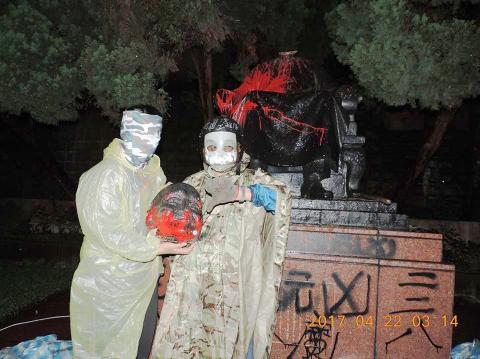A statue of Chiang Kai-shek (蔣介石) in Taipei’s Yangmingshan National Park (陽明山國家公園) was yesterday found decapitated.
The statue in Yang-ming Park was beheaded and had red paint smeared over it with a message saying: “228 mastermind” and “serial killer.”
A pro-independence group called the Taiwan Nation Founding Engineering Team (台灣建國工程隊) claimed responsibility for the incident.

Photo provided the Taiwan Nation Founding Engineering Team
“Chiang Kai-shek was the mastermind of the 228 Massacre. It is a universally accepted fact that he was one of the ‘big four murderers’ in history,” the group said in a statement.
“Allowing statues of murderer Chiang to be erected and worshiped in Taiwan is a disgrace,” it added.
The move was to “appease the ghost” of Japanese engineer Yoichi Hatta — known among Taiwanese as the “Father of the Chianan Irrigation System,” the group said, in reference to the beheading of a Hatta statue near Tainan’s Wushantou Reservoir (烏山頭水庫) on Sunday.
“Cut down one of ours and we will cut down countless of yours,” the group said.
Center director Sung Fu-hua (宋馥華) said the Taipei Police Department’s Beitou Precinct is investigating the matter.
The owner of the Yang-ming Park shop reported the defaced statue at about 8am yesterday to the Floriculture Experiment Center, which manages the park, Sung said.
“People throw paint at the Chiang statue in front of the floral park every year on Feb. 28,” she said.
The center had hired guards to protect the statue at night, but only recently ended the practice, she said.
The center said it covered the statue so visitors would not be disturbed.
“The head has yet to be found,” Sung said.
Sung said that vandalizing public property is an indictable crime, urging people not to flout the law with similar offenses.
Additional reporting by Huang Chien-hau

CHAOS: Iranians took to the streets playing celebratory music after reports of Khamenei’s death on Saturday, while mourners also gathered in Tehran yesterday Iranian Supreme Leader Ayatollah Ali Khamenei was killed in a major attack on Iran launched by Israel and the US, throwing the future of the Islamic republic into doubt and raising the risk of regional instability. Iranian state television and the state-run IRNA news agency announced the 86-year-old’s death early yesterday. US President Donald Trump said it gave Iranians their “greatest chance” to “take back” their country. The announcements came after a joint US and Israeli aerial bombardment that targeted Iranian military and governmental sites. Trump said the “heavy and pinpoint bombing” would continue through the week or as long

TRUST: The KMT said it respected the US’ timing and considerations, and hoped it would continue to honor its commitments to helping Taiwan bolster its defenses and deterrence US President Donald Trump is delaying a multibillion-dollar arms sale to Taiwan to ensure his visit to Beijing is successful, a New York Times report said. The weapons sales package has stalled in the US Department of State, the report said, citing US officials it did not identify. The White House has told agencies not to push forward ahead of Trump’s meeting with Chinese President Xi Jinping (習近平), it said. The two last month held a phone call to discuss trade and geopolitical flashpoints ahead of the summit. Xi raised the Taiwan issue and urged the US to handle arms sales to

State-run CPC Corp, Taiwan (CPC, 台灣中油) yesterday said that it had confirmed on Saturday night with its liquefied natural gas (LNG) and crude oil suppliers that shipments are proceeding as scheduled and that domestic supplies remain unaffected. The CPC yesterday announced the gasoline and diesel prices will rise by NT$0.2 and NT$0.4 per liter, respectively, starting Monday, citing Middle East tensions and blizzards in the eastern United States. CPC also iterated it has been reducing the proportion of crude oil imports from the Middle East and diversifying its supply sources in the past few years in response to geopolitical risks, expanding

Pro-democracy media tycoon Jimmy Lai’s (黎智英) fraud conviction and prison sentence were yesterday overturned by a Hong Kong court, in a surprise legal decision that comes soon after Lai was jailed for 20 years on a separate national security charge. Judges Jeremy Poon (潘兆初), Anthea Pang (彭寶琴) and Derek Pang (彭偉昌) said in the judgement that they allowed the appeal from Lai, and another defendant in the case, to proceed, as a lower court judge had “erred.” “The Court of Appeal gave them leave to appeal against their conviction, allowed their appeals, quashed the convictions and set aside the sentences,” the judges